If you’re planning to start your chicken farm, it’s important to pick the right chicken breed. You want to maximize egg production so that you’ll always have a ton of fresh eggs.
But what chicken lays the most eggs? The White Leghorn chicken lays the most eggs. This breed lays around 300 eggs every year. Also, a chicken of this breed holds the world record for the most eggs laid in one year. Not only does the White Leghorn lay a lot of eggs, but they are also large and a great choice for egg production.
The rest of this article will answer a few of the most frequently asked questions about eggs. You’ll learn which chicken lays the largest eggs, why chickens lay small or soft eggs, and more.
What Chicken Lays the Largest Eggs?
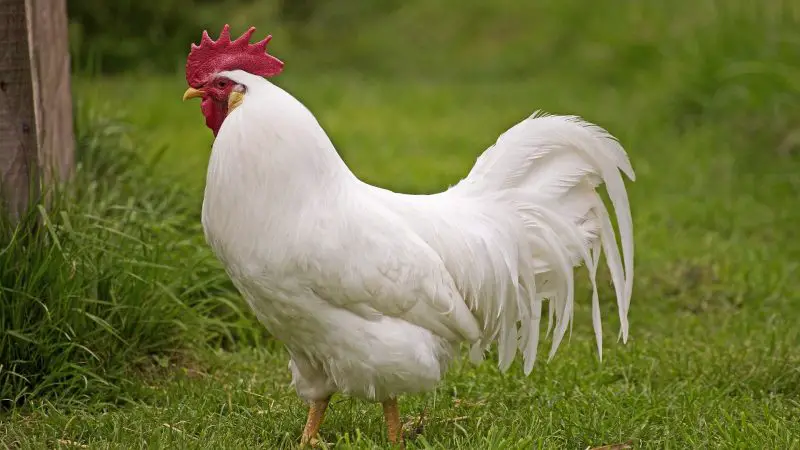
On average, the Minorca chicken lays the largest eggs. It’s followed closely by the White Leghorn, which incidentally holds the world record for the heaviest recorded egg laid by a hen. A larger chicken will produce a larger egg, but there is a degree of randomness involved.
It’s hard to say if the Minorca or the White Leghorn lays the larger egg. Since Minorca lays about 150-200 eggs, the eggs have more time to develop and get larger. But the White Leghorn lays approximately 250-350 eggs, so they produce more eggs overall.
Because of the unpredictability factor, the White Leghorn has a better chance of producing extra-large eggs.
Why Did Your Chicken Lay a Tiny Egg?
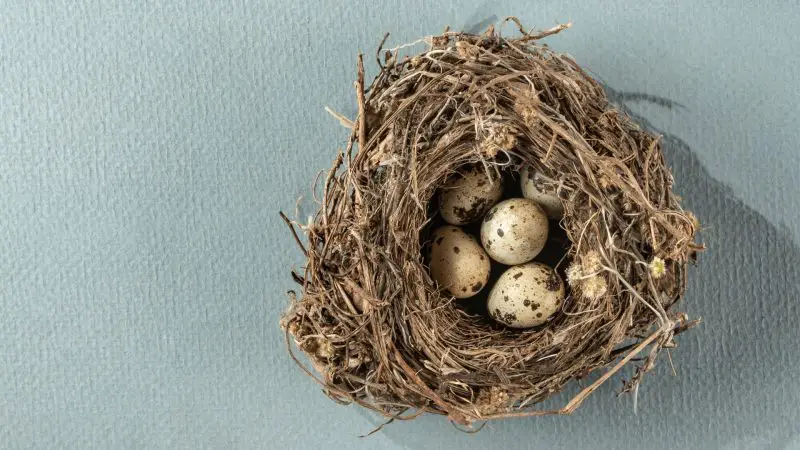
If your chicken laid a tiny egg, it’s likely because its oviduct didn’t have enough time to produce an egg yolk. Small eggs, commonly referred to as fairy eggs, are fairly common, especially with younger hens. Stress or poor health can cause fairy eggs as well.
Chickens start to lay eggs when they’re between 18 and 22 weeks old. It’s completely normal for a chicken to produce fairy eggs at this age. That’s the time when fairy eggs show up the most.
But a chicken may lay a tiny egg because of stress during the ovulation period. They are typically stressed out because of bad weather and even loud sounds.
Don’t worry if your chicken lays an occasional fairy egg. It’s nothing alarming. There’s a way to lower the chance of fairy eggs. You can insulate your chicken coop to reduce temperature-related stress and block some noise too.
Why Did Your Chicken Lay a Soft Egg?
Your chicken probably laid a soft egg because it doesn’t get enough calcium in its diet. Soft eggs, also called rubber eggs, can be fixed by supplementing the chicken with enough calcium. Also, avoid feeding your chicken food that prevents calcium absorption.
Stop feeding your chicken spinach, collard greens, and other vegetables. These veggies are delicious and healthy, but they contain high amounts of compounds that prevent calcium absorption. They combine with calcium to form indigestible salts, both in humans and chickens.
Thankfully, chickens will eat nearly anything. They use grit in their gizzards to process their food mechanically. This is their way of chewing food. Additionally, it’s easy to prevent soft eggs by supplementing their diet.
Feed your flock using soluble calcium-rich grit. Here are a few common things you can use:
- Limestone
- Crushed oyster or mussel shells
- Crushed eggshells
- Treated seashells
Oyster shells are the best and often result in larger eggs, too.
Are Duck Eggs Bigger Than Chicken Eggs?
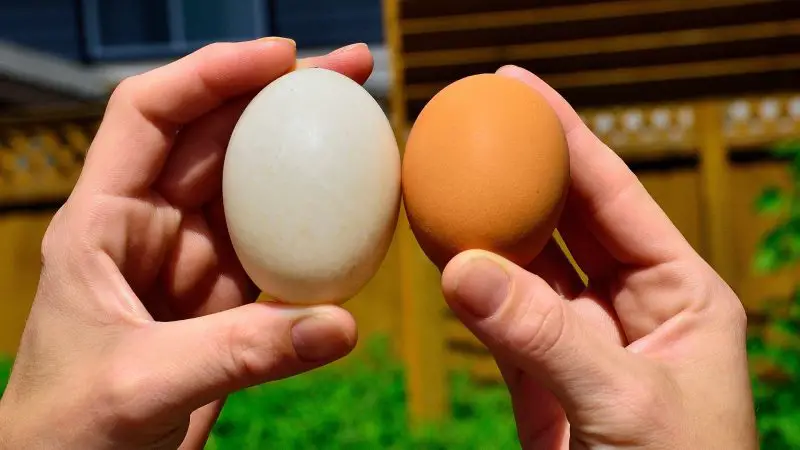
On average, duck eggs are bigger than chicken eggs. You can often find duck eggs that are twice as large as a chicken egg. Some duck eggs are the size of an extra-large chicken egg, and their yolks are also larger. So, duck eggs contain more fat, giving them a rich, creamy taste.
You can use duck eggs as a great substitute for chicken eggs. Just remember that one duck egg is at least 1.5x larger than a chicken egg. So, one to two duck eggs are enough for most people.
How a Chicken Lays an Egg Inside Another Egg?
A chicken can lay an egg inside another egg because of a phenomenon called counter-peristalsis contraction. Essentially, a developed egg gets trapped in a newly-formed oocyte. The outer egg fully develops and gets laid with another egg trapped inside.
An egg inside another egg is something you don’t see every day, although you can usually find videos on Youtube. It’s always a huge surprise when you crack open an egg for a cake only to find another egg lurking inside.
The inner egg is usually much smaller than an average one. On the other hand, the outer egg is almost always extra-large.
Do Chicken Eggs Get Bigger as They Get Older?
Chicken eggs do get bigger as they get older. An average chicken starts laying eggs at about 18-20 weeks of age. But they don’t fully develop until it’s about 40-45 weeks of age. During this period, the chicken matures, and the eggs get progressively bigger.
Most chicken eggs are proportional to the hens that lay them. Just like humans, chickens take time to grow and fully develop into adults. When a chicken is happy and fully grown, it’ll lay large eggs.
Likewise, a young hen will first lay tiny eggs. But that’s natural. The eggs will get much bigger when your hens are fully grown.
What Causes Huge Chicken Eggs?
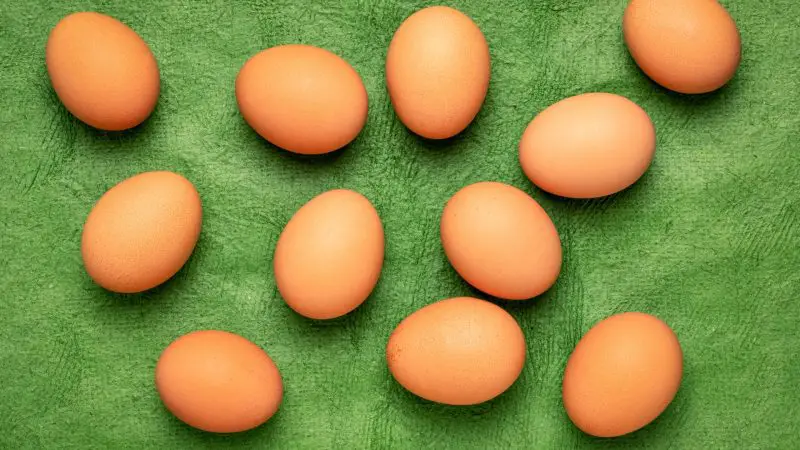
Huge chicken eggs are caused by several factors, such as a chicken’s breed, weight, food, and environmental conditions. If you want your chickens to lay big eggs, free-feed them. The chickens will grow larger and lay proportionately larger eggs.
In addition to the size and weight of your chicken, the breed plays the biggest role. If you want huge eggs on the regular, here are a few popular breeds:
- White Leghorn
- Minorca
- Welsummer
- ISA Brown
- Production Red
All of these breeds lay eggs that are larger than your average chicken egg.
What Breed of Chicken Lays Eggs Earliest?
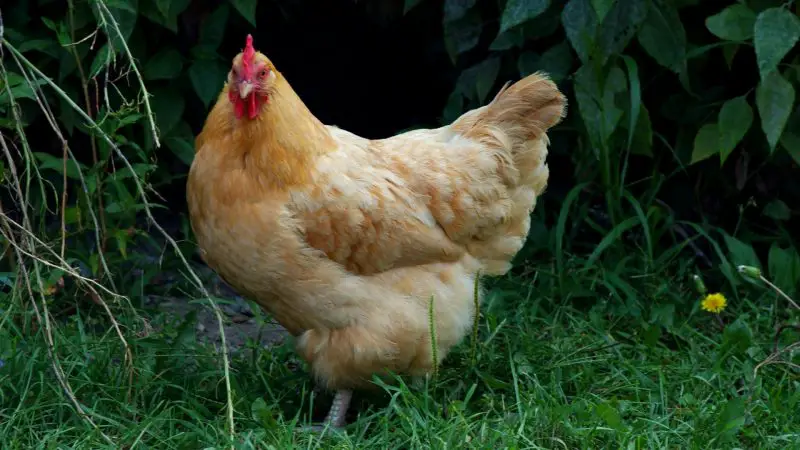
Several chicken breeds lay eggs at an early age, such as the White Leghorn, Rhode Island Red, Minorca, Golden Comet, and Barred Rock. Some of these breeds will lay their first egg at only 16-18 weeks of age. This is mostly because people bred these chickens to be fast egg layers.
Not only do these breeds lay eggs early, but they also lay lots of them. Additionally, you’ll notice that the first few eggs are much smaller than average. But don’t worry, these early layers will be producing extra-large eggs in no time.
Related: 12 Chicken Breeds That Lay Brown Eggs | Information and Facts
Does a Young Chicken Lay Smaller Eggs?
A young chicken will lay smaller eggs than an adult chicken. This is because the chicken is still developing. Young chickens are generally much smaller and weigh less than older ones. It’s normal to see very small eggs initially.
Most chicken breeds take about ten to 12 months to develop completely. The eggs will gradually get bigger as your chickens grow up.
Can a Chicken Hold in an Egg?
A chicken can hold in an egg, but only for a very brief period. If a chicken has to lay an egg, she’ll do so by the end of the day. However, eggs can sometimes get stuck in the oviduct, which causes the chicken a lot of pain and discomfort. It can even be fatal if not taken care of in a timely manner.
Chickens typically only hold an egg if their nest box is occupied. They may even fight for space, but it’s uncommon.
Furthermore, large eggs can get stuck in the oviduct, which is a huge problem. Stuck eggs can cause serious infections.
List of Sources
Egg Size and Your Small Flock of Laying Hens
Raising Your Home Chicken Flock
Effects of Diet and Gizzard Muscularity on Grit Use in Domestic Chickens
